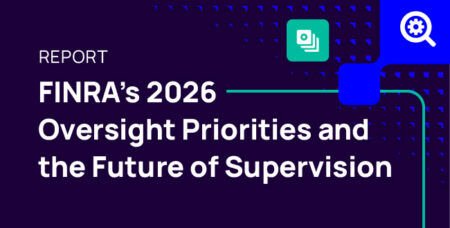Navigating Microsoft 365 Copilot Regulatory Compliance Requirements in Financial Services: A Guide
Is your organization facing an impossible choice between AI innovation and regulatory compliance?
Enterprise adoption of Microsoft 365 Copilot — Microsoft’s productivity tool that leverages AI to enhance workflows within Microsoft 365 apps — presents an urgent strategic decision: how to balance productivity gains with regulatory compliance requirements?
Gartner noted that more than 80% of enterprises will have used generative AI APIs or deployed generative AI-enabled applications by 2026. A study by the Bank of England and the FCA found that 75% of financial services firms are already using artificial intelligence; a further 10% plan to use AI over the next three years.
On the other hand, regulatory enforcement has escalated significantly, with $3.5 billion in penalties imposed since 2021 for inadequate recordkeeping of off-channel communications. As regulatory scrutiny increases and competitors embrace AI adoption, enterprises must rapidly establish governance frameworks that enable compliant deployment to secure their competitive positioning.
Why it matters
Organizations that further delay the implementation of AI tools, such as Microsoft 365 Copilot, risk a competitive disadvantage as others gain operational efficiencies. Thoughtful deployment and governance are crucial to ensure regulatory compliance and maintain recordkeeping and supervisory obligations.
Regulatory clarity demands immediate action
Financial regulators have established expectations that require organizational attention and action when implementing AI tools, such as Microsoft 365 Copilot and OpenAI’s ChatGPT Enterprise.
FINRA's Regulatory Notice 24-09 reminds member firms that FINRA's technology-neutral rules and securities laws continue to apply when firms use generative AI technologies. Specifically, FINRA Rule 3110 requires member firms to establish policies and procedures that address technology governance.
Similarly, ESMA's Public Statement on AI in retail investment services states that "firms' decisions remain the responsibility of management bodies, irrespective of whether those decisions are taken by people or AI-based tools.” Both regulators emphasize technology-neutral regulatory frameworks, meaning that compliance obligations apply immediately upon the deployment of AI.
Critical AI governance challenges requiring resolution
Firms implementing Microsoft 365 Copilot must navigate several complex governance challenges that require systematic solutions:
- Data security and privacy vulnerabilities: Generative AI tools process vast amounts of sensitive information, dramatically increasing the risks of data leaks or unauthorized sharing of confidential client details across systems and jurisdictions.
- Bias and ethical compliance concerns: AI-generated outputs may reflect biases in the training data, potentially leading to discriminatory decisions with implications under frameworks such as the EU AI Act and fair lending regulations.
- Technical preparedness gaps: Organizations require robust infrastructure and comprehensive policies to manage massive volumes of AI-generated data while maintaining audit trails and supervisory oversight.
- Transparency and explainability requirements: The "black box" nature of AI decision-making creates challenges in demonstrating compliance with suitability requirements and best interest obligations during regulatory examinations.
Essential governance best practices for implementation
Organizations must establish comprehensive governance frameworks that address regulatory requirements while enabling AI adoption:
- Clear governance policies: Develop enterprise-wide oversight guidelines covering AI usage, approval workflows, and employee interaction protocols with AI tools across all business functions.
- Regular assessments and monitoring: Implement continuous review processes to ensure the accuracy, bias detection, and regulatory compliance validation of AI-generated content, with documented remediation procedures in place.
- Enhanced data protection controls: Deploy active monitoring systems for data handling within AI environments to prevent unauthorized access, sharing, or processing of sensitive information.
- Staff training and competency programs: Establish mandatory education initiatives covering AI operational aspects, risk identification, ethical considerations, and regulatory implications for relevant personnel.
Core compliance requirements requiring attention
- Recordkeeping and supervision obligations: FINRA Rule 3110 requires firms to establish policies and procedures that address technology governance. FINRA's Regulatory Notice 24-09 clarifies that this governance framework applies to AI tools. Organizations must maintain comprehensive records of AI interactions, including prompts, responses, and associated metadata.
- Data governance and quality controls: ESMA expects firms to ensure that data used as input for AI systems is "relevant, sufficient, and representative," requiring meticulous oversight of data sourcing and validation processes with documented controls.
- Risk management frameworks: Both FINRA and ESMA expect firms to implement risk management processes for AI technologies. ESMA states that firms should "establish robust governance structures, conduct regular AI model testing, and monitor AI systems to identify and mitigate potential risks and biases.”
Operational risks requiring mitigation
Consider a portfolio manager at a large firm that uses Microsoft 365 Copilot to analyze market trends and generate investment recommendations based on a client's risk profile. Without proper capture of these AI-powered interactions, critical details are permanently lost: the specific prompts used to query Copilot, the recommendations generated based on the client's risk profile, and the reasoning behind investment suggestions.
Missing records of Microsoft 365 Copilot interactions lead to incomplete audit trails, which can result in regulatory examination deficiencies and substantial financial penalties. The absence of captured AI conversations makes it impossible to demonstrate suitability determinations or evidence compliance with best interest obligations when AI tools influence client recommendations.
Comprehensive capture solutions enable a competitive advantage
The Smarsh Capture integration for Microsoft 365 Copilot addresses these regulatory obligations through specialized capabilities designed specifically for AI governance:
- Complete interaction capture: Records prompts, conversations, files, images, and metadata from Microsoft 365 Copilot interactions exactly as users experience them, ensuring complete context preservation for regulatory examinations and supervisory review.
- Tamper-proof centralized archiving: Secures all captured content in immutable, centralized repositories via Smarsh archiving solutions, providing compliance teams with reliable access to complete records during audits while maintaining data integrity.
- Advanced search and insights: Enables rapid information retrieval across all Microsoft 365 Copilot interactions with threaded conversation context, facilitating prompt responses to regulatory inquiries and internal compliance reviews.
- AI risk detection capabilities: Automatically identifies and flags potential compliance concerns when integrated with surveillance solutions, providing proactive risk management for AI-generated content.
- Detailed governance controls: Implements precise policies for AI usage recording and monitoring, ensuring compliance with internal guidelines and external regulatory requirements across all jurisdictions.
Strategic considerations for AI adoption
The window for competitive advantage through AI adoption is narrowing rapidly. Financial services firms that establish comprehensive compliance capabilities can deploy Microsoft 365 Copilot across their workforce, capturing productivity gains while competitors remain constrained by compliance uncertainties.
The regulatory environment continues to evolve rapidly, with both key regulators, such as FINRA and ESMA, indicating ongoing monitoring and potential additional guidance. Firms that establish robust governance foundations now will position themselves to adapt quickly to regulatory changes while maximizing AI productivity benefits.
Enabling competitive advantage through compliance
Implementing Microsoft 365 Copilot does not require compromising regulatory compliance. Purpose-built solutions like Smarsh Capture enable enterprises to deploy generative AI technologies while ensuring that governance and compliance processes remain robust, secure, and examination-ready.
Organizations that establish comprehensive AI governance frameworks can maximize productivity benefits while maintaining regulatory compliance. This approach allows firms to deploy Microsoft 365 Copilot enterprise-wide, enabling competitive advantages through AI-enhanced productivity while competitors face compliance delays.
With appropriate governance frameworks and specialized compliance tools, enterprises can confidently implement Microsoft 365 Copilot and leverage its capabilities to drive operational efficiency and innovation. The combination of regulatory clarity, proven governance practices, and comprehensive capture solutions provides the foundation for successful AI adoption in regulated environments.
For more information about Smarsh innovations in AI compliance solutions, read our recent press release. Additional insights on eliminating compliance barriers for Microsoft 365 Copilot are available in our recent webinar.
Share this post!
Smarsh Blog
Our internal subject matter experts and our network of external industry experts are featured with insights into the technology and industry trends that affect your electronic communications compliance initiatives. Sign up to benefit from their deep understanding, tips and best practices regarding how your company can manage compliance risk while unlocking the business value of your communications data.
Ready to enable compliant productivity?
Join the 6,500+ customers using Smarsh to drive their business forward.





Subscribe to the Smarsh Blog Digest
Subscribe to receive a monthly digest of articles exploring regulatory updates, news, trends and best practices in electronic communications capture and archiving.
Smarsh handles information you submit to Smarsh in accordance with its Privacy Policy. By clicking "submit", you consent to Smarsh processing your information and storing it in accordance with the Privacy Policy and agree to receive communications from Smarsh and its third-party partners regarding products and services that may be of interest to you. You may withdraw your consent at any time by emailing [email protected].
FOLLOW US